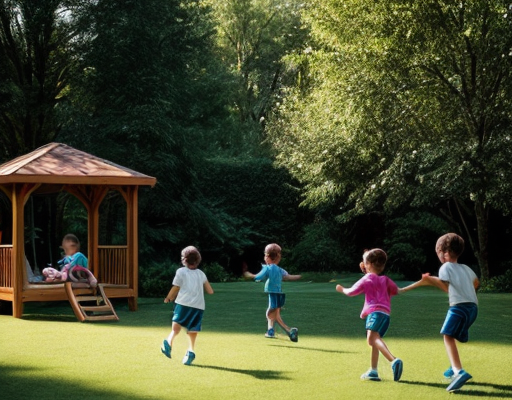
The Role of Outdoor Play in Child Growth
The Role of Outdoor Play in Child Growth
Introduction
Outdoor play is an essential part of a child’s development. It provides numerous physical, cognitive, social, and emotional benefits. In today’s digital age, where children are spending more time indoors, it is crucial to understand the importance of outdoor play in promoting holistic growth. In this article, we will explore the various aspects of how outdoor play positively impacts a child’s development.
Physical Benefits of Outdoor Play
1. Development of Gross Motor Skills
Outdoor play encourages children to engage in activities that involve running, jumping, climbing, and throwing, which help in developing their gross motor skills. These skills are crucial for everyday tasks such as walking, running, and maintaining balance.
2. Enhances Physical Fitness
Engaging in outdoor play promotes physical fitness and helps prevent obesity in children. Activities such as cycling, swimming, and playing sports improve cardiovascular health, increase agility, and build muscle strength.
3. Exposure to Vitamin D
Outdoor play allows children to be exposed to sunlight, which is a natural source of Vitamin D. This vitamin is essential for the development of healthy bones, teeth, and immune system functioning.
Cognitive Benefits of Outdoor Play
1. Stimulates Creativity and Imagination
Outdoor play provides children with the freedom to explore and create their own games, scenarios, and imaginary worlds. This fosters creativity, problem-solving skills, and the ability to think outside the box.
2. Enhances Cognitive Function
Outdoor play stimulates cognitive function by exposing children to different sensory experiences. Interacting with nature, playing with natural materials, and exploring the environment helps children develop observational skills, critical thinking, and decision-making abilities.
3. Improves Concentration and Focus
Children who engage in outdoor play regularly exhibit improved concentration and focus in academic settings. The diverse and stimulating outdoor environment helps reduce mental fatigue and enhances attention span.
Social and Emotional Benefits of Outdoor Play
1. Promotes Social Interaction
Outdoor play provides children with opportunities for social interaction and the development of important social skills. They learn to communicate, negotiate, and cooperate with their peers, fostering empathy, teamwork, and conflict resolution abilities.
2. Builds Resilience and Confidence
Challenging outdoor activities help children build resilience and confidence. Overcoming obstacles, taking risks, and learning from failures contribute to the development of a growth mindset and a positive self-image.
3. Reduces Stress and Anxiety
Nature has a calming effect on children. Outdoor play in natural environments reduces stress, anxiety, and symptoms of attention deficit hyperactivity disorder (ADHD). It provides a sense of freedom and improves overall mental well-being.
Tips to Encourage Outdoor Play
1. Create a Safe Outdoor Space: Ensure that the outdoor play area is safe and free from hazards. Install age-appropriate equipment, set boundaries, and provide proper supervision.
2. Be a Role Model: Show enthusiasm and participate in outdoor activities with your child. Serve as a positive role model by embracing nature and engaging in physical play.
3. Make it Fun: Incorporate elements of fun into outdoor play by introducing games, treasure hunts, and imaginative play scenarios. Utilize natural materials such as leaves, sticks, and stones to spark creativity.
4. Limit Screen Time: Encourage a healthy balance between outdoor play and screen time. Set screen time limits and include outdoor play as a regular part of your child’s routine.
5. Organize Play Dates: Arrange play dates with other children to foster social interaction and collaboration. Outdoor play is often more enjoyable when shared with peers.
Conclusion
Outdoor play plays a vital role in a child’s growth and development. It promotes physical fitness, cognitive development, social skills, and emotional well-being. By providing opportunities for outdoor play and incorporating it into daily routines, parents can help their children flourish holistically.

